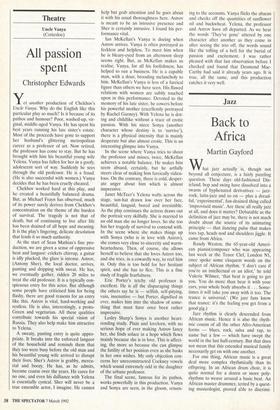Theatre
Uncle Vanya (Cottcsloc)
All passion
spent
Christopher Edwards
Yet another production of Chekhov's Uncle Vanya. Why do the English like this particular play so much? Is it because of its pathos and humour? Poor, washed-up, vir- ginal, middle-aged Vanya. He has spent his best years running his late sister's estate. Most of the proceeds have gone to support her husband's glittering metropolitan career as a professor of art. Now retired, the professor has come to stay. But he has brought with him his beautiful young wife Yelena. Vanya has fallen for her in a goofy, adolescent sort of way. Suddenly he sees through the old professor. He is a fraud. (He is also successful with women.) Vanya decides that he has been cruelly cheated.
Chekhov worked hard at this play, and he created a beautifully balanced drama. But, as Michael Frayn has observed, much of its power surely derives from Chekhov's concentration on the theme of the burden of survival. The tragedy is not that of death, but of continuing to live after life has been drained of all hope and meaning. It is the play's lingering, delicate desolation that lends it so much authority.
At the start of Sean Mathias's fine pro- duction, we are given a sense of oppressive heat and languor: crickets chirrup, a guitar is idly plucked, the glare is intense. Astrov, (Antony Sher), the local doctor, arrives, panting and dripping with sweat. He has, we eventually gather, ridden 20 miles to treat the old professor. It is a typically con- spicuous entry for this actor. But although some people have criticised him for being flashy, there are good reasons for an entry like this. Astrov is vital, hard-working and restless. He is also, interestingly, a proto- Green and vegetarian. All these qualities contribute towards his special vision of Russia. They also help make him attractive to Yelena.
A sweaty, panting entry is quite appro- priate. It breaks into the enforced languor of the household and reminds them that they too were busy before the old man and his beautiful young wife arrived to disrupt their lives. Sher's Astrov is grubby, mercu- rial and boozy. He has, as he admits, become coarse over the years. He cares for no one, and even his dalliance with Yelena is essentially cynical. Sher will never be a true ensemble actor, I imagine. He cannot help but grab attention and he goes about it with his usual thoroughness here. Astrov is meant to be an intrusive presence and Sher is certainly intrusive. I found his per- formance vital.
Ian McKellan's Vanya is dozing when Astrov arrives. Vanya is often portrayed as feckless and helpless. To meet him when he is bleary-eyed from an afternoon sleep seems right. But, as McKellan makes us realise, Vanya, for all his foolishness, has helped to run a business. He is a capable man, with a dour, brooding melancholy to him. McKellan's Vanya is less of a farcical figure than others we have seen. His flawed relations with women are subtly touched upon in this performance. Devoted to the memory of his late sister, he cowers before his powerful mother (excellently portrayed by Rachel Gurney). With Yelena he is dot- ing and childlike without a trace of erotic passion. With his niece Sonya (another character whose destiny is to `survive'), there is a physical intensity that is mainly desperate but also almost erotic. This is an interesting glimpse into Vanya.
In the scene where Vanya tries to shoot the professor and misses, twice, McKellan achieves a notable balance. He makes him seem absurd, certainly, but he artfully steers clear of making him farcically ridicu- lous. On the contrary, there is cold, desper- ate anger about him which is almost impressive.
Janet McTeer's Yelena wafts across the stage, sun-hat drawn low over her face, beautiful, languid, bored and irresistible.
As the play continues the actress draws out the portrait very skilfully. She is married to an old man she no longer loves. So she too has her tragedy of survival to contend with. In the scene where she makes things up with Sonya (who is in love with Astrov), she comes very close to sincerity and warm- heartedness. Then, of course, she allows herself to believe that she loves Astrov too, and she tries, in a cowardly way, to reel him in. Only this is too bold for her hesitant spirit, and she has to flee. This is a fine study of fragile fearfulness.
Eric Porter's tetchy old professor is excellent. He is all the disparaging things the others say he is — selfish, self-pitying, vain, insensitive — but, Porter, dignified as ever, makes him into the shadow of some- thing that must have once been rather impressive.
Lesley Sharp's Sonya is another heart- rending study. Plain and lovelorn, with no serious hope of ever making Astrov fancy her, she finds solace in a hope which flows mainly because she is in love. This is affect- ing, the more so because she can glimpse the futility of her position even as she basks in her own wishes. My only objection con- cerns her unreconstructed Cockney vowels which sound extremely odd in the daughter of the urbane professor.
The final scene, famous for its pathos, works powerfully in this production. Vanya and Sonya are seen, in the gloom, return-
ing to the accounts. Vanya flicks the abacus and checks off the quantities of sunflower oil and buckwheat. Yelena, the professor and Astrov have all departed. As we hear the words 'They've gone' uttered by one character after another as they come in after seeing the trio off, the words sound like the tolling of a bell for the burial of passion and excitement. I was rather pleased with that last observation before I checked and found that Desmond Mac- Carthy had said it already years ago. It is true, all the same, and this production catches it very well.


















































 Previous page
Previous page